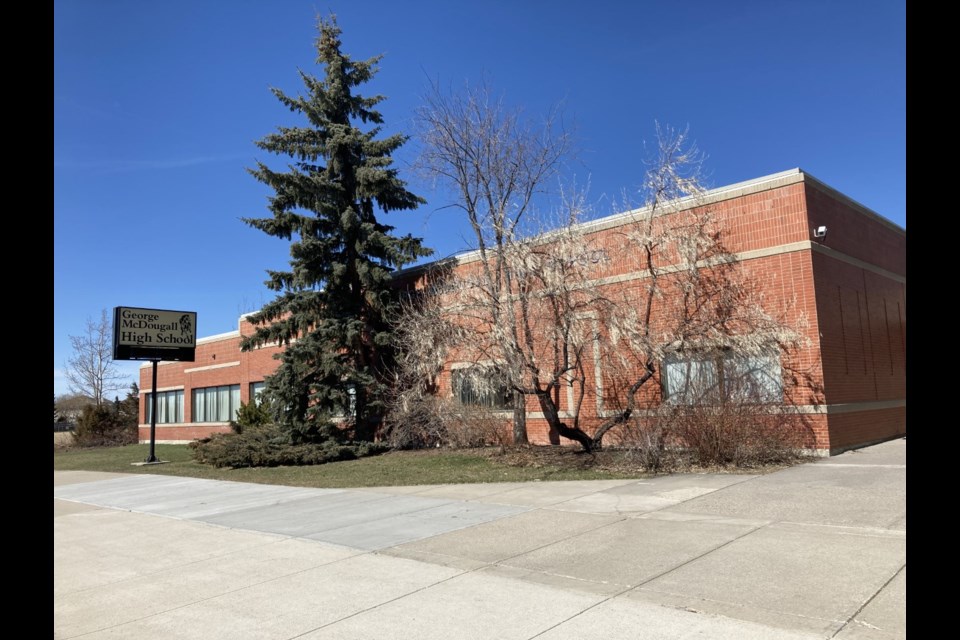A group of Airdrie residents put forward a presentation to the Rocky View Schools (RVS) Board of Trustees at the board’s regular meeting on June 17 to request the renaming of George McDougall High School.
Delegates Kim Cheel and Robbie White recommended the public school board put in place a process for the renaming of the school, in light of the recent discovery of a mass burial of 215 Indigenous children at the site of a former residential school in Kamloops, B.C. The remains of another 104 children were discovered shortly afterward at a former residential school site in Brandon, Man.
“[McDougall’s] part in history is not one that we should be honouring,” said Cheel during the presentation. “When you consider the lives that have been impacted by day schools, residential schools and by the Indian Act, [which it] is still so unfortunately named.”
George McDougall, who was a Methodist missionary in Canada in the 19th century, assisted in the Indigenous and settler negotiations that led to the development of Treaty 6 and Treaty 7. He also created the McDougall Orphanage and Home around 1875, shortly prior to his death in 1876.
According to a post on thechildrenremembered.ca, the day school was closed in 1910 and the Morley Indian Residential School was formed in its place. The residential school remained in operation until 1969.
“We know that at least nine children died [at Morley Residential School],” White said. “I suspect in the coming months and days, we may learn there were more deaths there.”
According to Cheel and White, McDougall was also responsible for the theft of the Manitou Stone, a 320-pound meteorite that is believed by First Nations to hold great spiritual power and significance. While the stone is currently housed at the Royal Alberta Museum, Indigenous groups have been petitioning for it to be returned to its native home.
“We don’t think it’s appropriate to honour someone [who] contributed to genocides and cultural destruction,” White said.
The delegates added that McDougall held no official ties to Airdrie or the surrounding community, and that it was odd for a local school to be named after him. George McDougall High School opened in 1962 and is Airdrie’s oldest high school.
“McDougall did not reside in Airdrie,” he added. “He passed away before Airdrie was incorporated as a community and if we look at the naming procedures... schools are named after the environment or community that they’re in.
“I think it would be more appropriate to take that into consideration for some of the existing schools.”
The naming of schools within RVS is guided by Administrative Procedure AP-5402 – Naming of Facilities. While RVS does not currently have a policy in place for the renaming of schools, Cheel said the delegates recommended the board to develop such a policy while working in tandem to change the name of George McDougall High School.
“Be mindful of who can be impacted by naming if the decision is made to name it after a person … to remember that stakeholders include settlers and Indigenous populations,” she added. “Airdrie is very much a settler town and so a lot of decisions have been made by the settlers.
“But there are knowledge keepers that need to be considered when we make such honourifics like naming a school after someone. Engaging the right people, understanding truth and reconciliation and decolonizing ourselves is a step that we need to take.”
Both Ward 2 Trustee Patty Sproule, and Ward 5 Trustee Judi Hunter thanked the delegates for their presentation but inquired for more information and sources on the history of George McDougall. While no decision or additional comment was made during the board meeting, further discussion is expected to take place in the future.
Cheel encouraged trustees to move forward and take action toward truth and reconciliation in the public school division’s community.
“A lot of times we do a lot of pretty talk and we bring things forward and apologies are made but if change isn’t made, then apologies are empty,” Cheel said. “They’re performative.
“We teach kids this – don’t say sorry unless you’re going to change your behaviour, so making a change is the next step after an apology, and it’s a step [towards] truth and reconciliation.”
Carmen Cundy, AirdrieToday.com
Follow me on Twitter @carmenrcundy


